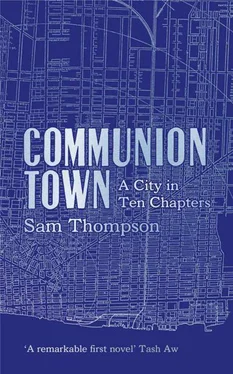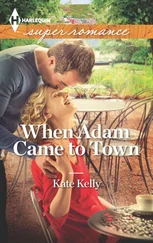Andie was highly amused to hear all this. That’s how it used to be, said Dawn, or at least that’s what I’ve read. It’s probably changed nowadays.
The women did seem to be preparing for something, carrying heavy-looking cardboard boxes, covered tureens and sacks of fuel pellets. A few groups of young men lounged at the tables, watching them work and drinking beer from small brown bottles. There were other early signs of festivity. A carnival figure, wearing white greasepaint and a scarlet ringmaster’s coat with a giant sunflower bobbing from the lapel, was prancing in between the passers-by, accosting the unwary with flourishes of a long-necked bottle. A fright wig protruded in stiff white tufts from beneath his bowler hat. He approached in a mincing waltz-step. Halting in front of Dawn, he poured clear fluid into a tin beaker, lifting his bottle up high to make a thin, bright stream in the air, and mimed an invitation to drink.
Dawn shook her head, and he transferred his invitation to Andie, mugging and winking madly. She wavered, then — oh well! — she accepted the beaker and tried a cautious sip. As she screwed up her face, the clown squealed in grotesque pleasure. He pointed after her, cackling, as they walked on.
Andie was smiling sportingly. That was sea water!
Next Andie wanted to try a bistro she had spotted near the promenade. She ordered metal saucepans full of mussels for both of them. She’d pay, she wanted to. Then she told Dawn that since they last saw each other, she had been married. It had been a year or so after she left school. He was nine years older and very good-looking and charming, but dishonest, as it turned out. It had been a mistake: she preferred not to go into the details.
The mussels were large, green-tinged and watery, and contained minuscule specks of sand that squeaked against the teeth. Dawn picked them off her lip and arranged them along the edge of the plate. At the next table, two girls were unwrapping something that lay between them like a human hand, damp, white and curled. It belonged in the sea. The head was decorated with fleshy whiskers. Its mouth worked weakly. One of the girls turned it over and bit into its pallid belly. Her teeth seemed to sink in easily: translucent skin stretched and separated. Her chin shining, she swallowed, and passed it to her companion.
To escape was the hardest thing in the world, Andie said. It had taken her a long time to realise no one was going to help her. She didn’t think it had made her less trusting, but it had made her a lot stronger. She had always known that he had a troubled past, but she had thought that investigating his history would mean she was too suspicious. She wouldn’t make that mistake again.
Dawn wondered if she should reach across the table, but her fingers were covered in grease.
She wasn’t working the next day, and they both slept late. They were not long up — Andie leaning against the kitchen counter with her coffee, Dawn sitting at the table getting ready to correct a stack of exercise books — when Charles appeared at the apartment.
He was dressed in the same clothes as yesterday. He carried himself like someone who knew the place well and had every right to be here. In the entrance hall behind him, three other young men waited, one sprawling on the sofa with his legs stretched out, the others shuffling their feet. Dawn couldn’t imagine how he had found out the address. But before she could find the right words to challenge him, he walked straight past her into the apartment, bowing in a small parody of civility.
As he entered the kitchen Andie gave him an uncomplicated grin, and waved hello. She didn’t seem surprised. He had apparently forgetten that Dawn was here. He took hold of Andie’s hand, his eyes flickering around her face, and said something. Dawn hesitated, and then explained to Andie’s look of eager inquiry that Charles and his friends had invited her to go with them to the feast at the seafront. Charles nodded in satisfaction, pulled over Dawn’s chair and sat down. He folded his arms, looked up at Andie, and said something else. It was a special honour for her to be asked, he was saying, a special chance. Usually, no one from outside the city. But he would take her.
He settled back to watch her make up her mind.
Andie heard the voices; they didn’t so much wake her as call her attention to the fact that she was awake. She felt fresh and clear-headed, as though she’d been asleep a long time, a sleep she had needed. The window was uncurtained and a searing placard of light hung awry on the opposite wall.
The voices were just outside the room. One of them, a man’s, deep and lazy, spoke with a heavy emphasis, just a few words at a time. By the sound of it he wanted something and was not going to leave until it was given. Dawn was responding, rebuffing his demands, it sounded like, in a placatory tone. Andie couldn’t really tell what it was about: they were speaking the local language. Well, it was nothing to do with her.
The door of her bedroom was half-open, and it seemed to her that the apartment door must be open too, with the speakers standing on either side of the threshold: she could picture them standing like that, Dawn perhaps even blocking his way in. If she got out of bed and put her head out into the corridor, she’d see. But she only pushed herself further up in the bed, and listened.
She didn’t know how to interpret the tones of voices here. She hated this city that made her seem so stupid. Last night had been a complete waste of time. She didn’t know why she’d gone. Once it was over, she’d felt like an idiot for leaving Dawn, and all the more so because when she finally managed to get away she’d lost her bearings in the stupid city and had ended up walking around by herself until late, wandering long stone lanes for what seemed like forever. Finally she’d recognised Dawn’s building. She’d tried not to make any noise when she came in.
The night felt, now, like a story she had heard, not a place she had been for herself. Everything about it was unconvincing. Charles had seemed nice enough, but as soon as they got down to the waterfront he’d dived, shouting, into a squad of his mates. The whole promenade had been filled with men sitting at the trestle tables, sharing bottles of wine and eating grilled fish off paper plates, or standing around in gangs which continually broke up and reformed in laughing discord. The sun had set half an hour before. Heat had gusted from the bonfires. What had she been expecting? To talk to new people, to hear some singing and maybe do some dancing. But none of them had seemed to want to talk to her or even look at her. In a funny way, she’d had the feeling they hadn’t noticed she was there, even as they crowded around with excited chatter and much impatient gesturing. The city’s words had cloyed the air, thick and meaningless, and no one had seemed willing to switch to a language she could understand. They hadn’t offered her anything to eat.
Her bitterness began to drain away. She was bored thinking about their boring festival. There was nothing to look at in this room except the sun on the wall. It was like those times when she was six or seven years old and had stayed at home pretending to be more sick than she really was, for which her reward was a day that was genuinely endless, not in length but in breadth, in which she lay in her bedroom, not reading or sleeping or really doing anything, with afternoon light dusting through the blinds and the bedroom door and window half-open so the strange sounds of daytime were removed from her not by barriers, only by distance.
She couldn’t tell, now, why she’d stayed out as long as she had. She didn’t know why she hadn’t just left as soon as she realised that it wasn’t going to be a normal party at all but some weird old tradition. At a distance, she had spotted a few red-faced women watching her with disapproval, but the men had led her through the crowd and into the empty middle of the semicircle of tables.
Читать дальше
Конец ознакомительного отрывка
Купить книгу












